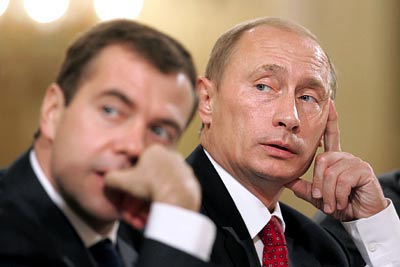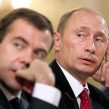
Russian Policy Objectives in Ukraine’s Presidential Election
Publication: Eurasia Daily Monitor Volume: 7 Issue: 14
By:

From its preliminary stages down to the January 17 first round, Ukraine’s presidential election has occasioned a full and continuous display of Russia’s strategic policy objectives toward the country.
Irrespective of the presidential run-off’s outcome on February 8, Moscow has already achieved—largely by default—three basic objectives regarding Ukraine.
First, the Kremlin no longer has reasons to fear the Orange freedoms’ contaminating effect upon Russia. Given Ukraine’s political and economic predicaments, it has lost the attractiveness of a democratic example to Russia’s populace or elite circles. If anything, Russian business interests associated with the political authorities’ powers seem poised for predatory takeovers of crisis-hit Ukrainian assets.
Second, Russia has managed to remove discussion of Ukraine’s hypothetical NATO membership from the political agenda. All serious parties and candidates now avoid this subject as a political liability in Ukraine and as an irritant to Russia.
And thirdly, Moscow has been content to watch the defeated President Viktor Yushchenko instrumentalize Ukrainian national identity issues as his last resort and “anti-Russian” card. Yushchenko’s tactics seemingly vindicated Russian President Dmitry Medvedev’s August 11 open-letter warnings to him and Ukraine. The outgoing president’s campaign has split the Ukrainian electorate in the west and center, complicating the country’s post-election politics even further.
The next tier of Russian objectives emerged both before and during the Ukrainian presidential election campaign. They can also be deduced in part from presidential candidate Viktor Yanukovych’s campaign statements. The operational order of Russia’s priorities should become somewhat clearer after the run-off’s outcome. Moscow’s post-election goals are mostly familiar ones, albeit in a changing Ukrainian and international context. They include:
— Introducing some form of shared control over Ukraine’s gas transit system (several forms are theoretically available), notwithstanding Ukrainian legislation explicitly banning all forms of alienating that transit system.
— Acquiring ownership in Ukrainian industries through Russian state banks and Kremlin-connected oligarchs.
— Expanding the use of the Russian language in Ukraine’s public sphere; and claiming an inherent Russian vetting right on Ukraine’s educational policies and interpretations of the national history.
— Using Ukrainian interest groups to link Ukraine with the planned Russia-Belarus-Kazakhstan Customs Union, which would delay Ukraine’s free trade agreement with the European Union and its association agreement with the EU.
— Stonewalling any preparations for withdrawal of Russia’s Black Sea Fleet from the Crimea, so as to render the 2017 withdrawal deadline inoperative long before its technical lapse, and necessitate its extension by Ukraine.
— Committing Ukraine officially (and notwithstanding the Russian Fleet’s presence) to neutrality or permanent nonalignment, which would foreclose the country’s option to join NATO in the future.
— Encouraging a double-vector discourse on Ukraine’s external orientation, which would confuse Western partners and Ukrainians themselves about the country’s intentions and prospects.
Russian business interests generally seem to await the final outcome of Ukraine’s presidential election, before bidding for Ukrainian industrial property. In one major case, however, they have jump-started the acquisition process before Ukraine can recover from crisis. In the second week of January, a consortium of Russia’s state-owned Vneshekonombank (chairman of the board: Prime Minister Vladimir Putin) and the Metalloinvest steel holding of Kremlin-friendly Alisher Usmanov announced a preliminary $ 2 billion deal to acquire some 50 percent ownership in the Industrial Union of Donbass, a major Ukrainian steel producer, with plants also in Hungary and Poland (Interfax-Ukraine, January 6, 8, 15).
Presidential candidate and Party of Regions leader Viktor Yanukovych seems not only alarmed, but also utterly confused about Russia bypassing Ukraine’s gas transit system through the Nord Stream and South Stream projects. In two campaign appearances, Yanukovych has called for Ukraine to invest in Nord Stream and South Stream, but at the same time bring Gazprom into Ukraine’s transit system in the hopes of ensuring larger gas transit volumes through Ukraine (Interfax-Ukraine, Inter TV, January 15, 19).
Some Russian representatives are testing Ukrainian reactions to more ambitious goals than those officially announced. Thus the CSTO’s Secretary-General, Nikolai Bordyuzha, has declared that Ukraine would be welcome to join the CSTO or participate in at least some of the organization’s activities (Interfax-Ukraine, January 18).
Ultimately, Moscow would hope to reach a point at which it could, together with Ukraine, define what Ukrainian interests are in the Russia-Ukraine relationship. According to Minister of Foreign Affairs Sergei Lavrov when dispatching Ambassador Mikhail Zurabov to Kyiv (see article above), Russian policy must ensure that Ukraine’s new president “understands not to make our relationship hostage to somebody’s ambitions…that have nothing in common with the Ukrainian people’s interests, or those of the Russian people” (Interfax, January 19).
Russia is still very far from achieving that kind of influence over Ukraine’s political system and decisions. However, Moscow’s intermediate objectives, as displayed during Ukraine’s presidential election campaign, could, if attained increase Russian political influence gradually to a significant level in Ukraine.




